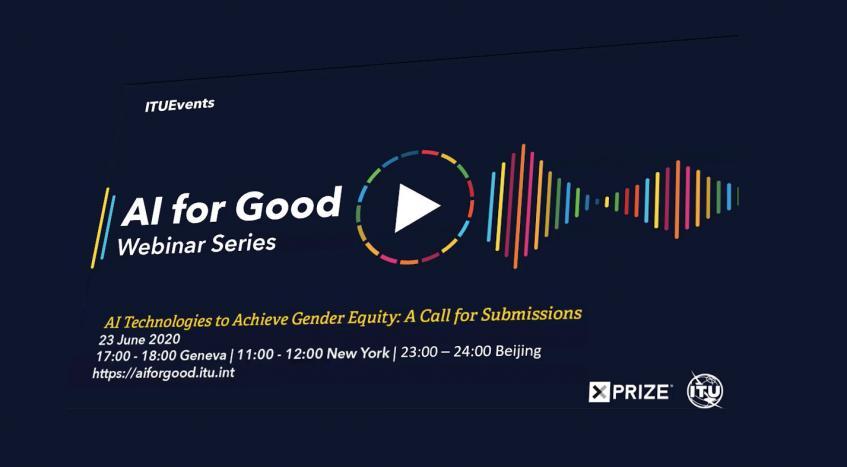AI Technologies to Achieve Gender Equity
On June 23rd, 2020, the AI for Good Global Summit hosted a webinar apart of their global dialogue on accelerating the United Nations sustainable development goals.
The panel was comprised of what the AI for Good Global Summit calls their Gender Brain Trust. This Brain Trust is a team of people with expertise in data and AI, short for artificial intelligence, systems to help drive global initiatives in the area of gender equity. Four out of the six members from the Brain Trust were present for the panel. Facilitated by Haneen Khalaf, who is the principal project manager at X Prize, the panel included research scientist at the IBM T.J. Watson Research Centre, Francesca Rosie, founder & CEO of Women@TheTable, Caitlin Kraft-Buchman, technology management consultant, Nicole Washington, and assistant professor at the computer science department of George Washington University, Aylin Caliskan.
This discussion mainly focused on introducing and describing the gender breakthrough track. The AI for Good gender breakthrough track has the goal of generating meaningful projects that have short- or medium-term impact on advancing the United Nations sustainable development goals by using AI data ecosystem, community building and collaboration. The topic of the webinar consisted of gender equity and how gender issues in general are related to technology and AI. One of the panelists, Francesca Rosie, touched on how the world that we live in is shaped by the point of view, habits and sometimes the physiology of men and how this is connected to gender equity and AI technologies. Data is what feeds the technology to help people make decisions and without checking that the data reflect what people want out of society then bias data is generated and leads to discriminations. A couple examples of this, as provided by Rosie, is car crash tests that are designed to protect men as well as protective equipment in the current COVID pandemic that favor to fit men rather than women.
Circling back to the purpose of this webinar, to discover how to leverage AI technologies to achieve gender equity, the Gender Brain Trust is seeking project submissions from the public from three topic areas. The first topic involves a project that can identify technical and non-technical ways to define, detect and evaluate algorithmic gender bias. This first topic is finding novel ways that look at algorithmic gender bias through various factors. Caliskan states “once we are using AI tools, we might be able to define and detect new types of biases or discover biases that people are not aware of”. Caliskan went on to talk about how once these AI tools are built, we can use them to evaluate AI bias and, in the future, possibly manipulate AI systems so they can lead to desired outcomes that promote gender equity. Some examples can be found in the form of intersectionality, culture, language, research environments, and/or social media presence.
The second topic is for a project that discovers how AI systems can be designed and used to help human decision making be more gender inclusive. For this topic, Kraft-Buchman questioned how to go about designing fair systems in AI. Kraft-Buchman gave an example of the medical systems and how the norm study populations were always Caucasian men. Through more research, it was discovered that this led to implicit biases and that a different system was needed that involved more intersectionality. Examples for this second topic include human resources, research, open source activities and policy making.
The third and final topic for a project is to bring light onto how diverse data sets can be identified and collectively leveraged to give a more complete picture in gender inequality to allow for more evidence-based policy making. According to Caliskan, AI is a double-edged sword. When looking at the perspective of collecting high quality data sets, we do not know what kind of implicit biases or historical injustices might be embedded in those data sets. For the third topic the Brain Trust is looking for a project that can come up with ways to combine public and private data sets to investigate biases and mitigate these biases. Examples for the third topic concerned government, corporations, organizations, research associations, education, health, to name a few.
After examining the three different topics, chief innovation officer at X Prize, Amir Banifatemi joined the webinar to talk about the logistics of the gender breakthough track and project initiatives. Banifatemi posted a link in the webinar chat, where the project ideas could be submitted. The deadline to submit projects and ideas is August 1st. According to Banifatemi, starting on August 5th, the Brain Trust will begin reviewing the submissions. The Brain Trust will then mentor project teams that are selected until August 25th. From there, the top three submissions will be chosen on September 1st and those teams will be guided through preparation for visibility of their project during the AI for Good summit week in September.
The next event of the AI for Good Global Summit is AI for Good Breakthrough Days, which are from September 21st through September 30th. To review or find more information on the AI for Good gender breakthrough track check out their website HERE !
The McClure School of Emerging Communication Technologies strives to offer the best academic programs in the IT (Information Technology), the game development and the Virtual Reality/Augmented Reality (VR/AR) industries. Our programs and certificates cover numerous aspects of the rapidly changing industries of information networking, information security, data privacy, game development, digital animation and the academic side of esports.
